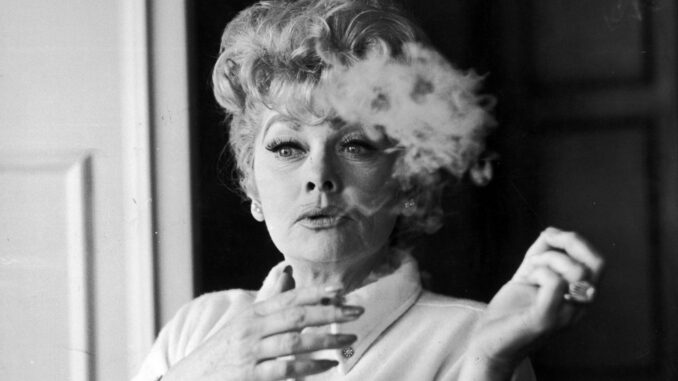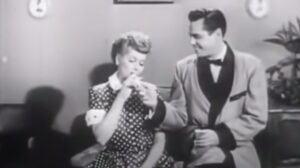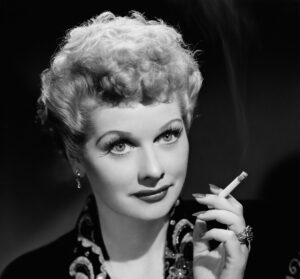
When you think of I Love Lucy, you probably picture Lucy Ricardo’s comedic antics, Desi Arnaz’s charming presence, and the laughter that filled homes in the 1950s. What most people don’t realize is that behind the smiles and sitcom stardom, I Love Lucy had a secret – one that contributed to a deadly habit. The show signed a cigarette sponsorship deal that promoted smoking to millions of viewers, intertwining comedy with a health hazard.
In this article, we’re going to delve into the details of how I Love Lucy got caught up in a deadly sponsorship deal, the impact it had on its audience, and the lasting consequences of this iconic show’s involvement in promoting smoking.

The Beginning of a Smoky Sponsorship
Back in the 1950s, smoking wasn’t just common – it was glamorized. Tobacco companies ruled the airwaves, and celebrities often played a key role in promoting cigarettes to the masses. For I Love Lucy, one of the most popular TV shows of the time, the allure of a big sponsorship deal was hard to resist. That’s when they signed a contract with Philip Morris, one of the largest cigarette manufacturers in the world.
Why Did I Love Lucy Sign a Cigarette Deal?
At the time, television shows were largely funded by corporate sponsors, and tobacco companies were some of the biggest spenders. Philip Morris saw an opportunity in I Love Lucy to market their products to a family-friendly audience, and the producers of the show welcomed the financial backing. After all, TV was still in its infancy, and securing funding was crucial for keeping the show on the air.
How Cigarette Companies Used TV Shows for Marketing
In the 1950s, cigarette ads were everywhere. But what made the I Love Lucy sponsorship particularly concerning was the way smoking was seamlessly integrated into the show itself. Lucy and Desi could often be seen smoking on screen, with cigarette packs strategically placed in scenes. It was a subtle, yet powerful form of advertising that normalized smoking in a way that traditional ads couldn’t.
The Impact of I Love Lucy’s Cigarette Ads on Viewers
For many viewers, I Love Lucy was more than just a TV show – it was a cultural phenomenon. As one of the most-watched programs in history, the show had an enormous influence on its audience. When Lucy and Ricky lit up cigarettes, it sent a message that smoking was not only acceptable, but glamorous. The subtle, integrated cigarette promotions blurred the line between entertainment and advertising, making it easy for viewers to overlook the risks.
Cigarette Ads in Prime Time: A Public Health Concern
The consequences of promoting cigarettes on a family show like I Love Lucy were far-reaching. At the time, the dangers of smoking were not widely known, and the tobacco industry worked hard to keep it that way. By aligning with a wholesome, beloved show, cigarette companies could reach a massive audience without raising red flags.
How Did the Sponsorship Affect Public Perception of Smoking?
The normalization of smoking on I Love Lucy contributed to the wider societal acceptance of cigarettes. While it’s hard to quantify just how many people took up smoking as a result, the show undeniably played a role in reinforcing the idea that smoking was not only normal but fashionable. The sponsorship blurred the lines between entertainment and advertisement in a way that would be heavily scrutinized today.
The Shift in Public Opinion: From Glamorous to Dangerous
Fast forward to today, and the world’s understanding of smoking has changed dramatically. The dangers of tobacco use are well-documented, and cigarette advertising is now heavily restricted. But back in the 1950s, this wasn’t the case. Shows like I Love Lucy helped create a culture where smoking was viewed as glamorous, not dangerous.

The Ethical Implications of Sponsoring Cigarettes
Today, we look back at I Love Lucy’s cigarette sponsorship and question its ethical implications. Could the producers have foreseen the deadly consequences of promoting cigarettes? Probably not. At the time, many people, including celebrities, were unaware of the true dangers of smoking. However, in retrospect, it’s clear that aligning a beloved TV show with a harmful product like cigarettes had lasting effects on public health.
How I Love Lucy’s Sponsorship Shaped TV Advertising
I Love Lucy wasn’t the only show to promote cigarettes, but it was certainly one of the most influential. The deal set a precedent for future product placements and endorsements in TV shows. Cigarette companies realized that embedding their products in popular programming could be more effective than traditional ads – a strategy that modern marketers continue to use with various products today.
The Lasting Legacy of I Love Lucy’s Deadly Deal
The I Love Lucy sponsorship may have ended long ago, but its impact lingers. Many people who grew up watching Lucy light up on screen went on to become lifelong smokers, influenced by the normalization of the habit in the media. Today, the show’s involvement in promoting smoking is often overlooked, but its role in shaping public attitudes toward cigarettes cannot be denied.
How TV Sponsorships Have Evolved
Thankfully, times have changed. With the advent of stricter regulations on tobacco advertising, the kind of sponsorship deals that I Love Lucy participated in are no longer possible. Today, TV sponsorships are more heavily scrutinized, with health-conscious brands taking the forefront in modern programming.
The Pushback Against Harmful Sponsorships in Media
In recent years, there’s been a pushback against harmful product placements and endorsements in media. With the rise of social media, consumers are more aware of how brands market their products, and there’s a growing demand for transparency and ethics in advertising. Had I Love Lucy been produced today, it’s unlikely that a cigarette sponsorship would have been allowed.
What We Can Learn From I Love Lucy’s Deadly Deal
The story of I Love Lucy and its cigarette sponsorship serves as a cautionary tale about the power of media and advertising. While it may have seemed harmless at the time, promoting cigarettes through a beloved TV show had real, lasting consequences. It’s a reminder of the responsibility that comes with influence, and the importance of making ethical choices when it comes to sponsorships and advertising.
Conclusion: The Price of Fame and Deadly Deals
I Love Lucy will always be remembered for its groundbreaking comedy and beloved characters. But behind the laughs, the show’s cigarette sponsorship left a darker legacy. The decision to promote smoking may have seemed like a harmless business deal at the time, but it contributed to the normalization of a deadly habit that would claim millions of lives. As we look back, it’s important to recognize the influence media has on our choices – and the responsibility that comes with it.